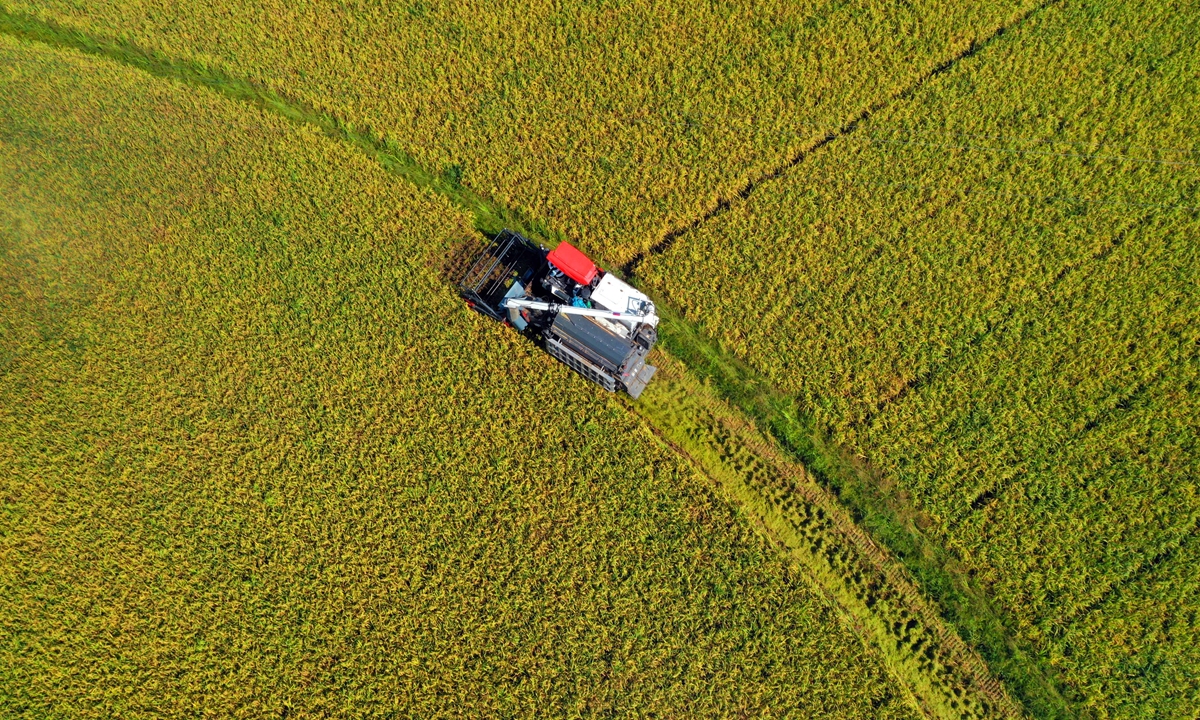
Farmers harvest early rice in Yongfeng, East China's Jiangxi Province on Tuesday. In the heat of the summer rush, farmers are busy harvesting 420,000 mu (28,000 hectares) of mature early rice to ensure that these summer grains are put into silos. Photo: VCG
Due to the impact of extreme weather, major global crop-producing areas have slashed their forecasts for harvests, sparking some concerns of food supply in China, as a major producing province in China has also been hit hard by floods.
While China needs to pay attention to the challenges posed by a decline in global food supplies, domestic supply will not face major shortages thanks to sufficient grain reserves and a better summer harvest, analysts said.
Torrential rains in Central China's Henan Province also sparked concern over grain production in China. The record floods affected 16 million mu (1.06 million hectares) of crops in Henan, the National Bureau of Statistics said in a press conference last week.
The production gap in Henan is crucial in China, as the province alone accounts for nearly 10 percent of total grain production, and more than one-fourth of the summer grain crop, Mei Xinyu, a research fellow at the Chinese Academy of International Trade and Economic Cooperation of China's Ministry of Commerce, told the Global Times on Sunday.
An agricultural products supplier surnamed Cui based in Zhengzhou, provincial capital of Henan, told the Global Times on Sunday that crops in the low-lying areas were all damaged by the floods.
"Crops in Henan were badly hit, the worst in years. It is estimated that 95 percent of farmers in Henan will not make money because of the pandemic and floods," he said.
Impact on Henan's agricultural sector comes as severe weather has also affected farmers in many other countries, including the US.
The US Department of Agriculture (USDA) in August lowered its forecast for all-wheat production in 2021/22 by 3 percent from the July forecast and down 7 percent from 2020/21. It also predicted that global wheat production this year for the top eight exporters will be down collectively by 9.2 million metric tons from the previous year.
Smaller harvests from major global producers will push wheat prices higher, but it will have a significant impact on China, due to sufficient grain reserves and a better summer harvest, Mei said.
"China has enough grain in reserve to last for at least a year. The summer grain harvest was basically completed before the floods. It is believed that the government will make every effort to ensure a good harvest in autumn," Mei said.
According to the NBS, China's summer grain crop in 2021 was up 2.1 percent year-on-year, and autumn grain production was stable overall, which has laid a good foundation for a good harvest.
According to the Ministry of Agriculture and Rural Affairs, the planting area of autumn grain is expected to reach more than 1.29 billion mu this year, larger than last year. Although the floods have hit Henan hard, autumn grain growth remain unaffected in most of other areas, the ministry said.






